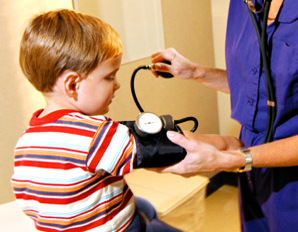It is a common perception that high blood pressure or hypertension affects older people. The fact is that high blood pressure can affect people of any age group. It is often noted in younger age groups and these days the incidence of high blood pressure in children is on the rise.
If not treated properly, high blood pressure can damage vital organs like eyes, kidneys, heart and brain. With early detection and optimal management, this damage can be avoided and kids with hypertension can lead a normal and active life.
What Counts as High Blood Pressure in Children?

Hypertension generally has no specific symptoms and the only way to find out if it is present is to get it checked regularly. The same is true for children, and the blood pressure of all kids aged 3 and above should be regularly checked.
Normal adult blood pressure values are determined and it is easy to interpret and compare the results with the standard levels. However, the situation is not that simple with children.
A child is diagnosed with hypertension when the blood pressure is higher than 95th percentile of children of the same age, gender and height. Generally, 3 readings are taken before reaching a diagnosis, as the first reading can be higher because of fear or anxiety associated with doctor’s visit. Constant ambulatory BP monitoring is used to minimize this stress and get accurate readings. During this process the child has to wear a BP cuff all day, and blood pressure readings are taken multiple times.
For a detailed explanation of how blood pressure is measured in children, please watch:
What Causes High Blood Pressure in Children?
Obesity
The most common cause of hypertension in kids is obesity. At the age of 7, half of the kids with hypertension are obese, and 85-95% of teenagers with high blood pressures fall under this category. Along with hypertension, obesity is also associated with other serious medical problems like diabetes and heart diseases.
Underlying Medical Problems
In some cases high blood pressure results from an underlying medical problem like kidney or heart disease. This is called secondary hypertension and once the cause is treated, the blood pressure returns to normal.
Side Effects of Medicines
Some medicines are known to cause elevated blood pressure, and if the child is on any of them, the blood pressure readings can be high. It is also an example of secondary hypertension and the blood pressure returns back to normal when the causative drug is discontinued.
Genetic Factors
There is frequently no definitive cause for essential or primary hypertension. This type of hypertension is more common in children with a family history of high blood pressure or of African-American origin.
How Is High Blood Pressure in Children Treated?
Lifestyle Changes
- Watch the weight: Obesity is the most common cause of hypertension in children and it is extremely important to shed the extra pounds for better blood pressure control.
- Get active: 60-90 minutes of physical activity is necessary for children on a daily basis, encourage them to be active and limit the time they spent sitting in front of TV or computer screens.
- Eat right: Try to swap the sugary cereals and white bread with whole grain options and give them plenty of fresh fruit and vegetables.
- Cut back on salt: The recommended daily allowance of salt for kids is 1.2 grams for the age group 4-8 years, and 1.5 grams for older children. Add less salt while cooking and carefully read the labels on processed food to check how much salt they contain.
- Stock and shop wisely: Kids normally munch on whatever is available at home, so try to shop and stock healthy options.
- Involve the family: Kids need a lot of support to deal with any kind of medical problem. Try to encourage everyone at home to be supportive and adopt a healthy lifestyle.
You can control your child’s blood pressure effectively by strictly following the treatment plan advised by your physician and getting the blood pressure monitored frequently. With a healthy diet, active lifestyle and proper monitoring, complications can be avoided and the child can lead a healthy and happy life.
Medication
Medications are generally not prescribed for mild hypertension in children. Usually, lifestyle modifications, losing extra weight and treatment of any underlying condition can offer proper control. However, if these measures are not successful, the child may need to be on medication. The duration of treatment can vary and medicines may be needed for a short while or for an indefinite period of time.
The most commonly used medications to treat high blood pressure in children include:
- Diuretics: These remove extra fluid and salt from the body, resulting in lowering of blood pressure.
- ACE inhibitors, alpha blockers and calcium channel blockers: These keep the blood vessels dilated, resulting in better blood flow and reduced blood pressure.
- Beta blockers: Medicines belonging to this group counter the effects of adrenaline, which is a stress hormone and is responsible for a faster heart rate. Blockage of these effects results in lowering of heart rate and blood pressure.
